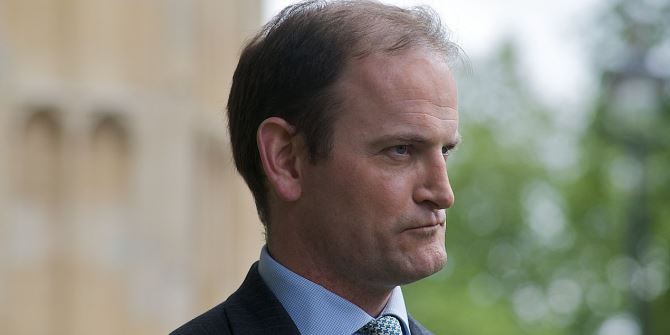 The UK Independence Party started 2013 riding high, after enjoying their two best ever-election results towards the end of the year. Rob Ford offers a detailed analysis of what is driving this electoral success, arguing that UKIP is a much more complex proposition than most political commentator seem to grasp. Nonetheless, it will take a significant change of strategy for their current momentum to translate into election success. Without local strongholds they will win nothing in a general election.
The UK Independence Party started 2013 riding high, after enjoying their two best ever-election results towards the end of the year. Rob Ford offers a detailed analysis of what is driving this electoral success, arguing that UKIP is a much more complex proposition than most political commentator seem to grasp. Nonetheless, it will take a significant change of strategy for their current momentum to translate into election success. Without local strongholds they will win nothing in a general election.
The UK Independence Party had their two best ever by-election results in late 2012 – scoring a record 14% in Corby in mid-November, then topping this again with 21% in the Rotherham by-election. This sharp rise in support – and the continued polling and by-election misery of the Liberal Democrats – have understandably lead to a lot of discussion. Where is support for UKIP coming from? What do UKIP leaning voters want? And what are the implications of UKIP’s rise in the polls for British politics going forward?
To answer some of these questions, I can draw on a very large and comprehensive data sources to show this – the British Election Study Continuous Monitoring Survey, conducted by YouGov every month since about 2004. This is an invaluable resource, with detailed information on the views and political preference of hundreds of thousands of voters surveyed over the past 8 years.
Table 1: How UKIP supporters voted in the previous election Source: British Election Study Continuous Monitoring Survey 2004-12, fielded by YouGov. Standard demographic weights applied
Source: British Election Study Continuous Monitoring Survey 2004-12, fielded by YouGov. Standard demographic weights applied
First, let’s take a look at where UKIP voters come from. Table 1 charts how current UKIP voters report having voted in the previous election. Since the Coalition began in 2010, UKIP’s support has more than doubled, from under 4% just after the 2010 election to nearly 9% in the most recent poll months. A big part of this rise is indeed due to Conservative defections – the share of former Conservatives among UKIP voters has risen. But it has risen from a low base. In 2009, roughly 2 in 10 UKIP voters had voted Conservative in the previous election. Now, it is 4 in 10. So, even now less than half of UKIP’s current support is coming from former Tory voters.
Another 40% or so voted “other” in the previous election – these are mostly UKIP loyalists who cast ballots for their current party at the last election. Might such voters be tempted over to the Conservatives? Perhaps, but research I have done with colleagues on UKIP loyalists suggests many come from working class, Labour leaning backgrounds, and are deeply hostile to all the establishment parties. This is borne out in the YouGov data – UKIP supporters’ views of all three parties’ leaders are strongly and persistently negative, and they are more likely to express alienation from politics and dissatisfaction with democracy. It is very doubtful that the Conservatives would sweep such voters if they allied with UKIP. And on top of this, a further quarter of recent UKIP support has come from Labour and the Lib Dems, or from abstainers. These are not groups the Conservatives are likely to win over with an alliance.
So, while some Conservative support seems to be leaking to UKIP recently, they are by no means solely a home for discontented Tories. This brings us to the second question – what motivates UKIP voters? UKIP politicians themselves tend to trumpet their growing popularity as vindication of their core agenda: Europe. While British voters have become more sceptical about the EU over recent years – unsurprising give the steady flow of “Eurozone crisis” news – there is little evidence that the rise in UKIP support is the result of a surge in concern about the EU.
Table 2 shows the four most popular answers UKIP supporters have given since 2004 when asked what is the most important issue facing Britain. The most popular answer, by far, is immigration, named by 30% of UKIP respondents overall, and the most popular answer in every single year since 2004. Europe has seldom even been the second biggest issue in UKIP voters’ minds: since 2008, the economy has taken precedence, and before that voters were more likely to point to a general dislike of the Labour government. To put in bluntly, most UKIP voters (unlike most UKIP politicians) do not regard Europe as the main issue on the agenda.
Table 2: Most important issue, UKIP voters Source: British Election Study Continuous Monitoring Survey 2004-12, fielded by YouGov. Standard demographic weights applied
Source: British Election Study Continuous Monitoring Survey 2004-12, fielded by YouGov. Standard demographic weights applied
So UKIP’s rise is clearly not the result of temporary defections by Conservative voters annoyed about Europe. What, then, is going on? My ongoing research with Matthew Goodwin suggests that UKIP shares many characteristics with “radical right” parties such as the Dutch Party for Freedom, the Danish People’s Party, the Austrian Freedom Party and the True Finns. Like these parties, UKIP mobilises voters who are primarily concerned about immigration, but are also typically nationalist, Eurosceptic and deeply disaffected with the existing political elite. In many cases these parties, or their leaders, began on the mainstream right, before breaking away to focus on a more populist agenda.
UKIP’s evolution has been similar – it began as a rebellion on the centre-right over Europe, but under Nigel Farage has developed a broader populist and anti-immigration agenda. UKIP’s appeal – anger over immigration, anxiety about national identity, hostility to the EU and a deep disaffection with “politics as usual” – cuts right across traditional party dividing lines, enabling the party to recruit angry voters regardless of who is in charge. As table 1 shows, UKIP was as successful winning over grumpy Labour voters during the previous government as it is at winning grumpy Tories now.
What lessons can the parties draw from all this? The Conservatives need to realise that Michael Fabricant’s plan for a blue-purple alliance is, in the words of one of my colleagues, “the politics of not understanding data”. UKIP voters are a more diverse, and disaffected, lot than right wing Conservative backbenchers seem to realise. Most are not former Conservative voters, and are unlikely to be thrilled if their party – which recently ran on the slogan “Sod The Lot: vote UKIP” – were to align itself with a political elite which disgusts them. A UKIP alliance will deliver few votes, and less seats. Indeed, by alienating moderate voters, such an alliance could do more harm than good.
Labour should not celebrate the rise of UKIP either. UKIP’s agenda – hostility to immigration, social conservatism, Euroscepticism and populism – proved almost as appealing to Labour voters in 2004-10 as it is to Conservatives right now. UKIP’s strongest support often comes from older working class voters, who often have traditional left wing loyalties. A strong UKIP will pose as many problems for an incoming Labour government as it does for the Conservative incumbents.
Finally, UKIP politicians and activists themselves need to develop a clearer understanding of what the surge in UKIP support means. UKIP’s voters, new and old, are angry about immigration, threatened by social change, and deeply hostile to the political class. This does reflect a coherent set of public concerns – we find it in other countries too – but it is not the concerns which most exercise many UKIP activists, who are often focussed on deregulation, tax cuts, and above all, Brussels.
This disconnect raises a serious problem for UKIP: it cannot become a genuine “third force” in British politics without an activist base able to mobilise voters. Yet the concerns which seem to attract activists to UKIP are very different to those which attract voters to the party. This may explain why UKIP’s persistent inability to break through in local elections – the party lacks the candidates and activists willing to undertake the hard slog of local politics, or a coherent agenda to sell to local voters.
This is the difference between the Liberal Democrats and UKIP. The Lib Dems have a relentless focus on local organisation, and use this to channel popular discontent into local election wins, by-election wins, and eventual Westminster success. Tip O’Neill once observed that “all politics is local”, and under first past the post this is the brutal truth: UKIP may carry on rising in the national polls, but without local strongholds they will win nothing in a general election. Nigel Farage is riding high right now, but without a radical shift in party strategy I wouldn’t bet on seeing him or any of his colleagues warming the benches of the House of Commons in 2015.
This post was first published on Political Betting.
Note: This article gives the views of the author, and not the position of the British Politics and Policy blog, nor of the London School of Economics. Please read our comments policy before posting.
Robert Ford is a politics lecturer at the University of Manchester. Robert’s book on UKIP and BNP support “The right wing revolt” (with Matthew Goodwin, University of Nottingham) will be published by Routledge in 2014.








Informed article but yet again a total reliance on statistics. I would suggest you take a good look at what is happening in the NE Rob Ford. I totally agree with your comments re grassroot/street/local activists. UKIP has taken note. In Newcastle/Gateshead, 3 seats were contested at the last local election. On May 22nd 74 of the 78 available seats will be contested, all by members who have never stood for any office before, myself included. One further note to dispel the myth that UKIP are taking votes from Tories only….there is not one single conservative councillor in Newcastle/ Gateshead, just a lab/lib dem coalition. Lib Dem will take a hammering here for one simple reason. The perception is that they will side with any party for power…in coalition with the Tories in national government & with labour in local government…..the less polite local term…they will shit in any bucket springs to mind.
Oh and i should mention too that, despite all their other good intentions, Britain’s so-called ‘Green’ party are actually in favour of relaxing border controls even further than they are currently. So in other words, as an pro-environmental force they are effectively impotent. I consider this sad, because if they adopted an environmentally responsible immigration stance I, and many of my friends would certainly vote for them.
You forgot another important reason as for why many people are turning to UKIP- and that is out of a grave concern for Britain’s natural environment, which is threatened far more than anything else by immigration and the resulting overpopulation which is its logical result. Lib/Lab/Con can try to hoodwink people all they like by claiming immigration has no link with population density, but the recent census results tell a different story. More people means more houses, roads, cars, shopping developments, hospitals and schools – to not make the connection between the knock on effects of immigration and the destruction of natural spaces would be utterly cretinous. That said i dont agree with the views of some UKIP mps (for instance, their support for ‘fracking’), but the detrimental effects of this will be nothing compared to another few million human beings cramming into our overcrowded country.
There’s no mistake, U.K.I.P. is a broad church, and that will be our future strength!
One certainty is, if U.K.I.P. ever became like the rest of the political parties, they will not last a day, because it’s members have steadfast principles, and will not lose them for love nor money.
UNTO ONE’S SELF BE TRUE! this is a motto that would suit members and voters of U.K.I.P.
Thanks for the reply Marty. I am not quite sure what to make of the “truthfulness” criterion without some examples of UKIP being more truthful than the other parties. To be perfectly honest, many of UKIP’s policy positions seems quite impractical to implement, and they seem very evasive about this problem. For example, UKIP is officially very fond of tax cuts but doesn’t explain how it will fund them, and is very fond of immigration cuts but doesn’t explain how these will be implemented beyond calling for a rethink of EU migration.
However, the perception that a party which adopts very clear, but impractical, policy positions on issues like immigration, Europe etc is “truthful” and uses “common sense” is a very widespread one, and a common explanation for populist party support. In truth, what is often going on here is that UKIP doesn’t ever have to face the trade-offs of governing. It can hence promise the public all sorts of things without ever having to deliver them. Parties in government, or aspiring to govern, have to be more cautious, or they risk a severe backlash when they fail to deliver (as they inevitably do). The Lib Dems have learned this lesson the hard way.
Perhaps the real problem, which UKIP benefits from, is that governments no longer have the capacity to deliver many of the things voters want, but have not found a way to explain this honestly to their electorates. But UKIP are no more “truthful” on this score than others – they also promise many things which in reality they would struggle to deliver.
On the truthfulness side of it, look at the things that UKIP have brought to light, do you see Lab/Lib/Con proactively advertising that the EU cost £53 million a day or that the ‘Freedom of Movement Rights’ that come into effect in 2014 will open the doors to 29 million immigrant workers, of course not because there is no benefit in it for them and even less benefit for the country. People do need to start listening to some hard facts and then question why the other parties are not telling the British public the truth. UKIP does have a long way to go before ever being in a position to try and do what is best for the country, as you pointed out we do not have a single seat, yet but that can be sped up by people looking at what UKIP have to say and deciding for themselves what they want. Even without seat in parliament UKIP are already making changes, imagine what will happen once the people give them those seats by voting.
Well put Marty. for years the electorates views on immigration and Europe have been largely ignored by the ruling parties . Even now, we have the most powerful people in the United States and now Germany trying to tell us what is best for the UK. It isn’t what we have to lose of course. It’s their interest which they have at the top of the agenda. For £53m a day, we here in the UK have an absolute right to determine our own future and the prospect of being party to Euro legislation which gives the green light to another 29 million immigrant workers frankly, should alarm every citizen of this country. Given a candidate and in the absence of a pledge to secure our borders from EU intervention, I will be voting UKIP along with a growing number of people who care about our future.
Great article but there is another kind of UKIP supporter that seems to have been left out of the equation, the logical voter. They are those who realise that UKIP is the only party that is actually saying things that the other parties would much rather remained undisclosed. By informing the British public of the things that the other parties are more than happy to keep secret it shows that the party believes in truthfulness and this is a very rare commodity in politics today and one that is not only attracting voters from the other parties but also those who had virtually given up on voting all together. I personally believe it is UKIPs basic commonsense honesty that is the reason for the sudden popularity rise and this is what people want. Something that will become far more apparent, way before the 2015 General Election.